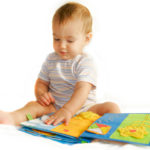
11 Apr Fond Farewells: explaining death to a four-year-old
Kristy Diffey takes a direct approach to explaining death to her four-year-old son.
Grief is a funny thing… It can sneak up on you at unexpected moments. Moments such as when we read a story to Jack, and we notice that Andrew is not there to get as excited about the book as Jack.
One of the good things about living in the country is that you have more room for pets such as ducks, chickens, lambs and calves. The bad thing about this is that sometimes, usually, as soon as you have given them a name, they have a tendency to die.
I suppose it serves me right that our pet duck died soon after we had named him after the much-loved title character from the storybook Ping. One day last October, we returned home from a long drive and knowing that Ping had been unwell that morning, I rushed to the chicken house. My worst fears were confirmed when I saw him lying perfectly still where we had left him only hours before.
My husband emerged from the house to find me in tears with a shovel in my hands. After discussing whether or not we should tell our four-year-old son, Jack, what had happened and if we should show him Ping’s body, we decided that we would. We called Jack outside and told him the sad news, and he patted Ping as my husband dug a hole. We explained simply that Ping had become sick and died, that it was a bit like sleeping, but that Ping would not wake up. It was Jack’s idea to pick some flowers and place them on top of Ping before we buried him. I was worried that Jack would be upset, but while he did tell people in a sad voice, “Ping died,” which generated some questioning glances my way, he seemed to cope well.
Perhaps the arrival of two goldfish, purchased on the same day that Ping died, helped to cushion the blow. We thought that we were seriously tempting fate by naming them Dorothy and Nemo, but they continue to thrive.
Then, last December, my brother-in-law, Jack’s beloved Uncle Andy, died suddenly at the age of 34. We were away on holiday at the time and had to pack up and leave early. We decided to explain to Jack what had happened before we set off. With tears in our eyes, we told him that his uncle had become very sick and had died unexpectedly. Jack looked very serious and then said, “Can I watch Shrek now?”
We were momentarily taken aback. Had he understood what we were saying? Should we tell him again? In the end, we decided to leave it at that. We hadn’t told him that Uncle Andy was sleeping or had gone away. Just that, sadly, he had died. We thought we would wait and see. Halfway home, Jack piped up from the back seat: “Jess gets along well with Lucky doesn’t she?” We agreed that Jess, Andrew’s dog, did indeed get along well with our dog Lucky. Jack nodded and said thoughtfully, “That’s good isn’t it?” My husband and I looked at each other silently, our hearts breaking. By understanding that Jess may have to come and live with us, Jack was showing us that he understood that Andrew was gone.
And so we returned home to a life that would never be the same. I remembered that as a child, I had not gone to my grandfather’s funeral, and I wondered if Jack should go to Andrew’s. In the end, we decided that he should. After all, there would be no coffin disappearing on a conveyor belt or descending into flames, and we were hoping for a celebration of a life rather than a sad gathering – though at the funeral of any young person, there is always great sadness. We felt that it was important that Jack should get a chance to say goodbye.
At the funeral, Jack was good for a while – and then he got wriggly. He hopped off my lap and plonked himself front and centre in the room, just out of reach of my husband and me, and did the loudest fart he could manage. Andrew, an uncle of the ‘pull my finger’ variety, would have laughed his head off.
I still think we made the right decision telling Jack about death and not sugar-coating the truth to make it more palatable, even though it breaks my heart now when he tells me that he misses Andrew and sometimes Ping. I assure him that we all do, and I hug him, and then, in the way of small children, he’s fine and off doing something else.
Grief is a funny thing. It doesn’t start off huge and gradually taper off. It can be overwhelmingly at the forefront of your mind, or it can sneak up on you at unexpected moments, such as when we read a story to Jack and notice that Andrew is not there to get as excited about the book as Jack.
We feel as if we have been robbed of so many opportunities, and so has Jack: of riding on the tractor with Andrew, building enormous towers out of blocks, sneaking chocolates and laughing endlessly at the pull-my-finger jokes. All we can do is continue, and try to make sure that while Jack hasn’t got a future with Andrew, he has lots of memories.




